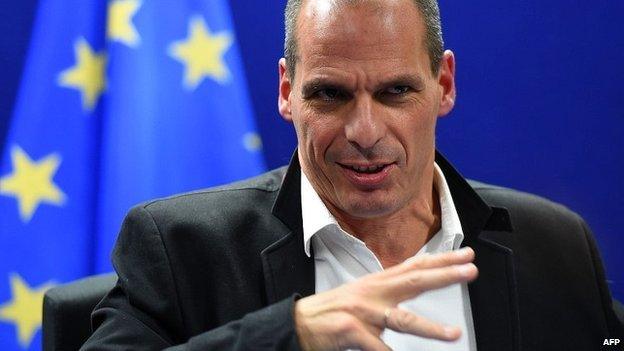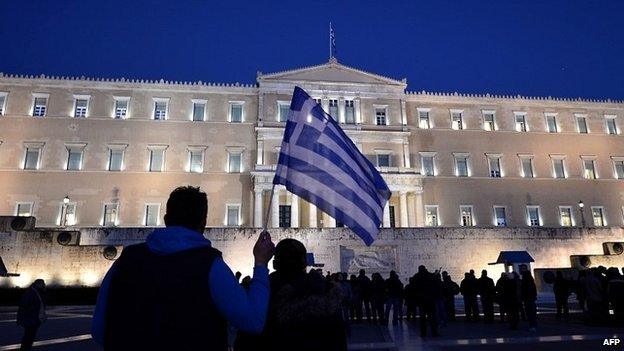Greece saved from disaster - for two days
- Published
- comments

Yanis Varoufakis believes he has been given the green light to ease up on austerity
Greece and Germany have stepped back from the brink. And for now Greece remains in the eurozone.
But there will be months of fraught negotiations before it will be clear whether the economy and finances of this recession-battered nation have been put back on a stable footing.
In fact, what was agreed on Friday night guarantees there will be no fresh crisis - no fears of Greece quitting the eurozone - for a full two days.
Because by Monday night, the Syriza government has to submit a preliminary list of proposed economic reforms - which will form the basis of negotiations till the end of April on a new financial settlement for the country.
If the Eurogroup were to reject that preliminary list, well in theory all bets would be off - and we would be back to wondering whether Greece is in or out of the euro.
As for the substance of the Eurogroup statement, external, inevitably both Germany and Greece were claiming victory.
Greek wriggle room
Certainly the Germans have won on the issue of form - in that Greek Finance Minister Yanis Varoufakis has in the end agreed to a four-month extension of the current bailout, which is something his government swore it would never do.
Also, the monitors and enforcers of the agreement will remain Brussels, the IMF and the European Central Bank - the so-called troika so hated by Syriza (although the statement carefully avoids using the loathed term for the three-legged stool).
And the language of the statement is all about the Greeks promising to "honour their financial obligations to all their creditors fully and timely" and adopting measures to "guarantee debt sustainability in line with the November 2012 Eurogroup statement".
But along with the language of Teutonic fiscal rectitude, Mr Varoufakis has clearly secured some important wriggle room.

There was enough in the Eurogroup statement to warrant some celebration in Athens
The fact that the Syriza government can submit its own list of economic and financial reforms to supplant those pledged by its predecessor is a breakthrough - although of course the Germans could still veto what Syriza ends up proposing.
That said, Mr Varoufakis was very clear that his government is not required to implement pension cuts and VAT rises which it has been resisting.
From his point of view what matters most is that he believes he has been given the green light to ease up on austerity, to cut spending or raise taxes less than the last administration committed to do. How so?
Well for 2015, the Eurogroup statement says that the primary surplus - or the budget surplus excluding interest payments - will be determined taking account of the "economic circumstances".
Which Mr Varoufakis says means Greece no longer has to generate a 3% primary budget surplus.
And in the longer term he is confident Greece will no longer have to generate primary surpluses much higher than 3% - which again had been promised by the last government.
Or to put it another way, he genuinely believes he has released Greece from the shackles of austerity.
What is less clear is whether the jailer, Germany, also sees Greece as having been liberated to hop and skip without the burden of having to augment taxes and fillet public spending.
Or to put it another way, it may be reasonable for Athenians to party tonight. But the Germans may yet turn out the lights.